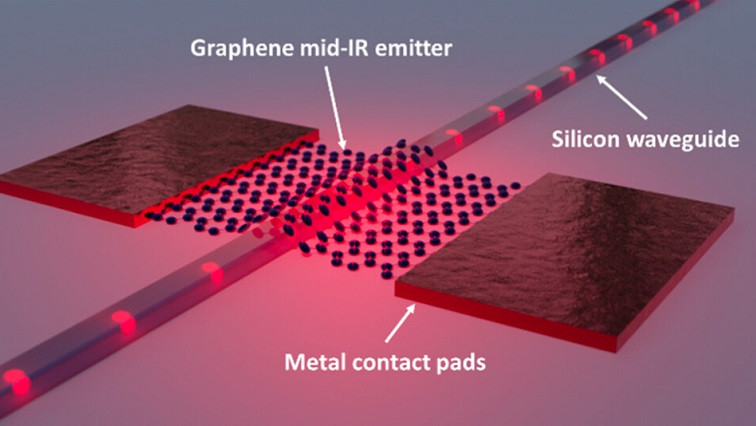
Researcher at AMO GmbH, KTH Royal Institute of Technology, Senseair AB and the University of Bundeswehr have successfully developed a waveguide-integrated incandescent thermal mid-infrared emitter using graphene as the active material. This innovative approach significantly enhances the efficiency, compactness, and reliability of gas sensor systems, paving the way for widespread application across various industries.
Gas leak detection, industrial process control, environmental monitoring, and medical diagnostics are all applications that require robust, real-time air quality monitoring solutions, driving the demand for distributed, networked, and compact gas sensors. Traditional gas sensing methods, including catalytic beads and semiconducting metal oxide sensors, suffer from performance degradation, frequent calibration needs, and limited sensor lifetimes due to their reliance on chemical reactions.
Absorption spectroscopy offers a promising alternative by utilizing the fundamental absorption lines of several gases in the mid infrared (mid-IR) region, including greenhouse gases. This method provides high specificity, minimal drift, and long-term stability without chemically altering the sensor. The ability to “fingerprint” gases through characteristic absorption wavelengths, such as carbon dioxide (CO2) at 4.2 μm, makes it an ideal technology for precise gas detection.
Photonic integrated circuits (PICs) represent a significant advancement in miniaturizing spectroscopy equipment to chip size, resulting in highly compact and cost-efficient optical gas sensor systems. However, the integration of light sources and detectors directly on the wafer level remains a challenge. Overcoming this hurdle could further reduce sensor size and cost, enhance mechanical stability, and improve performance.
Graphene has emerged as an excellent candidate for mid-IR emitters due to its ability to reach the necessary temperatures for thermal emission and its favorable emissivity. Its monolayer structure allows for ideal near-field coupling without significantly distorting the waveguided mode, making it perfect for integration with silicon photonic waveguides.
In this study, Nour Negm and colleagues have integrated graphene emitters directly on top of silicon photonic waveguides, enabling direct coupling into the waveguide mode. This setup successfully detected emissions in the spectral range of 3 to 5 μm, demonstrating the potential of graphene-based emitters to for air quality monitoring.
This result marks a significant step forward in developing efficient, compact, and reliable gas sensor systems. The work has been performed within the EU projects Ulisses and Aeolus, which aim at developing enhanced capabilities for real-time air quality monitoring in diverse applications in urban areas.
TrendForce 2024 Infrared Sensing Application Market and Branding Strategies
Release: 01 January 2024
Format: PDF
Language: Traditional Chinese / English
Page: 172
|
If you would like to know more details , please contact:
|











